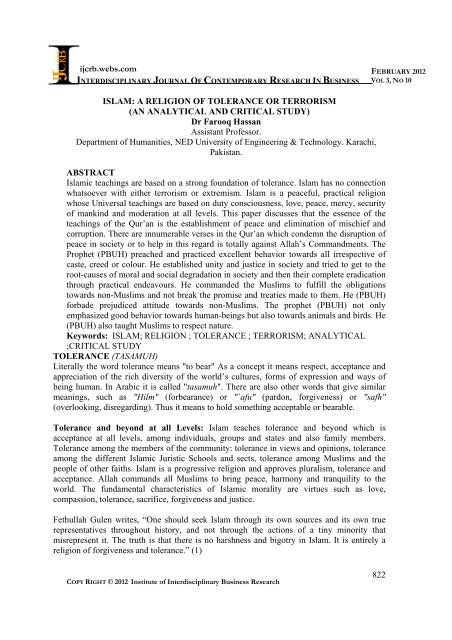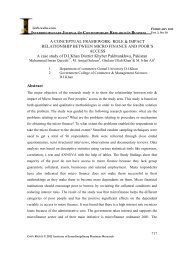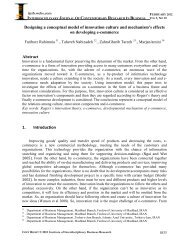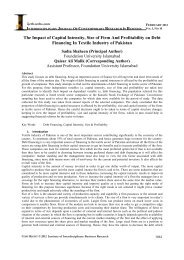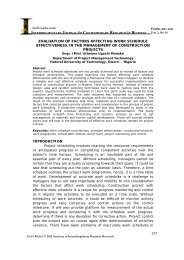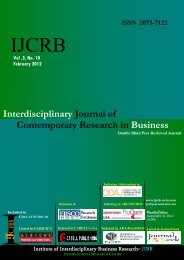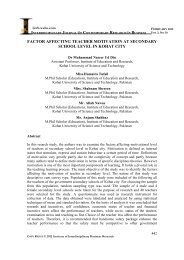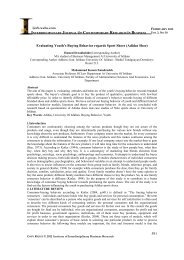A RELIGION OF TOLERANCE OR TERRORISM - journal ...
A RELIGION OF TOLERANCE OR TERRORISM - journal ...
A RELIGION OF TOLERANCE OR TERRORISM - journal ...
You also want an ePaper? Increase the reach of your titles
YUMPU automatically turns print PDFs into web optimized ePapers that Google loves.
ijcrb.webs.com<br />
INTERDISCIPLINARY JOURNAL <strong>OF</strong> CONTEMP<strong>OR</strong>ARY RESEARCH IN BUSINESS<br />
FEBRUARY 2012<br />
VOL 3, NO 10<br />
ISLAM: A <strong>RELIGION</strong> <strong>OF</strong> <strong>TOLERANCE</strong> <strong>OR</strong> TERR<strong>OR</strong>ISM<br />
(AN ANALYTICAL AND CRITICAL STUDY)<br />
Dr Farooq Hassan<br />
Assistant Professor.<br />
Department of Humanities, NED University of Engineering & Technology. Karachi,<br />
Pakistan.<br />
ABSTRACT<br />
Islamic teachings are based on a strong foundation of tolerance. Islam has no connection<br />
whatsoever with either terrorism or extremism. Islam is a peaceful, practical religion<br />
whose Universal teachings are based on duty consciousness, love, peace, mercy, security<br />
of mankind and moderation at all levels. This paper discusses that the essence of the<br />
teachings of the Qur’an is the establishment of peace and elimination of mischief and<br />
corruption. There are innumerable verses in the Qur’an which condemn the disruption of<br />
peace in society or to help in this regard is totally against Allah’s Commandments. The<br />
Prophet (PBUH) preached and practiced excellent behavior towards all irrespective of<br />
caste, creed or colour. He established unity and justice in society and tried to get to the<br />
root-causes of moral and social degradation in society and then their complete eradication<br />
through practical endeavours. He commanded the Muslims to fulfill the obligations<br />
towards non-Muslims and not break the promise and treaties made to them. He (PBUH)<br />
forbade prejudiced attitude towards non-Muslims. The prophet (PBUH) not only<br />
emphasized good behavior towards human-beings but also towards animals and birds. He<br />
(PBUH) also taught Muslims to respect nature.<br />
Keywords: ISLAM; <strong>RELIGION</strong> ; <strong>TOLERANCE</strong> ; TERR<strong>OR</strong>ISM; ANALYTICAL<br />
;CRITICAL STUDY<br />
<strong>TOLERANCE</strong> (TASAMUH)<br />
Literally the word tolerance means "to bear" As a concept it means respect, acceptance and<br />
appreciation of the rich diversity of the world’s cultures, forms of expression and ways of<br />
being human. In Arabic it is called "tasamuh". There are also other words that give similar<br />
meanings, such as "Hilm" (forbearance) or "`afu" (pardon, forgiveness) or "safh"<br />
(overlooking, disregarding). Thus it means to hold something acceptable or bearable.<br />
Tolerance and beyond at all Levels: Islam teaches tolerance and beyond which is<br />
acceptance at all levels, among individuals, groups and states and also family members.<br />
Tolerance among the members of the community: tolerance in views and opinions, tolerance<br />
among the different Islamic Juristic Schools and sects, tolerance among Muslims and the<br />
people of other faiths. Islam is a progressive religion and approves pluralism, tolerance and<br />
acceptance. Allah commands all Muslims to bring peace, harmony and tranquility to the<br />
world. The fundamental characteristics of Islamic morality are virtues such as love,<br />
compassion, tolerance, sacrifice, forgiveness and justice.<br />
Fethullah Gulen writes, “One should seek Islam through its own sources and its own true<br />
representatives throughout history, and not through the actions of a tiny minority that<br />
misrepresent it. The truth is that there is no harshness and bigotry in Islam. It is entirely a<br />
religion of forgiveness and tolerance.” (1)<br />
COPY RIGHT © 2012 Institute of Interdisciplinary Business Research<br />
822
ijcrb.webs.com<br />
INTERDISCIPLINARY JOURNAL <strong>OF</strong> CONTEMP<strong>OR</strong>ARY RESEARCH IN BUSINESS<br />
FEBRUARY 2012<br />
VOL 3, NO 10<br />
TERR<strong>OR</strong>ISM (IRHAB)<br />
In Arabic terrorism is called “Irhab” and a terrorist is “Irhabi” and extremist is called<br />
Mutatarrif. The Plural of “ Mutatarrif” is “ Mutatarrifoon” . In Arabic it is said Tatarrafa fi<br />
Kaza means he crossed all levels of moderation and was not on a middle path. The terms<br />
“Islah (social reformation, betterment )” and “Fasad”(mischief) have been frequently used<br />
in the Qur’an.<br />
Shaikh Abu Jafar Muhammad bin Jarir al- Tabari (d. 310 Hijra) says “Al- Ifsad” (Mischief,<br />
corruption, spoiling, ruining) is anything that is a cause of suffering and loss for people. It is<br />
advisable to free the society of such disruptive forces. On the other hand, “Islah” (social<br />
reformation, betterment, improvement) is a thing which leads to betterment of society”. (2)<br />
Islam does not teach “Irhab” (terrorism) and “Fasad” (Mischief, corruption, spoiling,<br />
ruining). On the other hand it preaches protection of life and property. If terrorism is<br />
becoming a source of contention, by spreading its tentacles, Islam teaches effective ways of<br />
taking control of the hostile situation and by countering it. Islam lays great emphasis on love<br />
of mankind, peace and security, duty consciousness, and moderation. It is a peaceful and<br />
practical religion with a Universal appeal. According to the Qur’an and Sunnah, it is the<br />
responsibility of each and every Muslim to actively propagate well-being and happiness and<br />
eliminate evil.<br />
Allah says in the Qur’an:<br />
1. (2:205) “And Allah doesn’t love corruption”<br />
2. (28:77) “Verily, God does not love the spreaders of corruption!”<br />
3. (7: 56) “ Do not spread corruption on earth after it has been so well ordered”<br />
4. (2: 191) “ for oppression is even worse than killing”<br />
5. (2: 217) “Oppression is more awesome than killing”<br />
6. (2: 224) “and promote peace between men”<br />
7. (8:1) “ And keep alive the bonds of brotherhood among yourselves”<br />
8. (24:22) “ let them pardon and forbear”<br />
9. (5: 32) “ If anyone slays a human being-unless it be (in punishment) for murder or for<br />
spreading corruption on earth- it shall be as though he had slain all mankind: whereas, if<br />
anyone saves a life, it shall be as though he had saved the lives of all mankind”<br />
Al-Tabari, Muhammad bin Jarir (d. 310/923), a famous Jurist and historian, has discussed<br />
and proved the various aspects of this verse (5:32) in detail by various quotations.<br />
According to one view the meaning of “if anyone saves a life” is “to forgive inspite of<br />
having the power to take life for life”. According to another view it means, “a person who<br />
saves another from drowning, burning and killing” yet another meaning says “to save one<br />
from falling to death” This amounts to saving the entire humanity from death and<br />
destruction. This is also quoted that, “a person who refrains from killing a human being<br />
COPY RIGHT © 2012 Institute of Interdisciplinary Business Research<br />
823
ijcrb.webs.com<br />
INTERDISCIPLINARY JOURNAL <strong>OF</strong> CONTEMP<strong>OR</strong>ARY RESEARCH IN BUSINESS<br />
FEBRUARY 2012<br />
VOL 3, NO 10<br />
has given life to the entire mankind” A piece of advice given by Qatada is quoted “O<br />
Children of Adam! Save mankind from destruction and give it life with your wealth and<br />
if it is in your power, give life to mankind by forbearance and forgiveness for their sins”<br />
(3)<br />
THE PURPOSE <strong>OF</strong> SHARI’AH: ESTABLISHMENT <strong>OF</strong> THE PEACE <strong>OR</strong><br />
MISCHIEF?<br />
What kind of society does Islam want to prepare? One thing is crystal clear that the purpose<br />
of Shari’ah is positive development, welfare and betterment of society and not creation of<br />
strife, commotion and chaos. While analyzing the purpose of Shar’iah Imam Al-Ghazali,<br />
Abu Hamid (d.505/1111), a great theologian, logician, jurist and mystic writes,<br />
“The very objective of Shari’ah is to promote the welfare of the people which lies in<br />
safeguarding their faith, their life, their intellect, their posterity, and their wealth. Whatever<br />
ensures the safeguarding of these five serve public interest and is desirable.”(4)<br />
Ibn Qayyim, al-Jawziyya’s (d.751/1350) statement also supports similar theme about the<br />
purpose of Shari’ah, he writes “The basis of Shari’ah is wisdom and welfare of the people in<br />
this world as well as the hereafter. This welfare lies in complete justice, mercy, well- being<br />
and wisdom. Anything that departs from justice to oppression, from mercy to harshness, from<br />
welfare to misery and from wisdom to folly, has nothing to do with Shari’ah.” (5)<br />
CONDEMNATION <strong>OF</strong> TERR<strong>OR</strong>ISM IN TRADITIONS <strong>OF</strong> PROPHET (PBUH)<br />
When the prophet (PBUH) was born the entire Arabian peninsula was in the clutches of<br />
political, cultural, social and economic turbulance. Lawlessness and barbarism were sources<br />
of pride for them. Buying and selling of men and women was their business. Women were<br />
treated with degradation. The Prophet (PBUH) spent his entire life trying to develop the<br />
characters and personalities of people in the noblest manner. He (PBUH) taught his people<br />
love for knowledge, politeness and sophistication, forbearance, forgiveness, acceptance for<br />
difference of opinion, equality and justice in such a way that tyrants with mean natures<br />
transformed into extremely kind people with lofty and noble natures. People who burried<br />
their daughters alive became guardians and protectors of their respect and modesty.<br />
Emphasis on excellent behaviour with people: The Prophet (PBUH) gave the people<br />
irrespective of their caste, creed or colour a very clear understanding of their position and<br />
status in society and also the nature of their mutual relationships and attitudes. He (PBUH)<br />
also said that people who wish for Allah’s closeness and love must be good, kind and loving<br />
with mankind in general. He said, “All mankind is Allah’s family; the best among you in the<br />
sight of Allah is he who is human towards his family.”( 6)<br />
An excellent example of equality and justice to mankind: One of the major causes in the<br />
rapid growth of conflict, strife and terrorism in society is total absence of justice and<br />
deprivation of the due rights of people. Another worth mentioning factor is also the division<br />
COPY RIGHT © 2012 Institute of Interdisciplinary Business Research<br />
824
ijcrb.webs.com<br />
INTERDISCIPLINARY JOURNAL <strong>OF</strong> CONTEMP<strong>OR</strong>ARY RESEARCH IN BUSINESS<br />
FEBRUARY 2012<br />
VOL 3, NO 10<br />
and sub-division of people in a Muslim society on the basis of caste, creed, religion and sect<br />
thereby leading to exploitation of the masses. The above mentioned factors pollute the<br />
atmosphere of society. The Holy prophet (PBUH) said: “People are like teeth of a comb”(7)<br />
All human beings are the sons and daughters of Adam: The Prophet (PBUH) brought to<br />
people’s attention the actual nature of mankind by saying that men and women are the sons<br />
and daughters of Adam who was made of clay. People, therefore, must always remember<br />
their humble, earthly origin and not transgress the limits set by Allah. He said: “You are<br />
children of Adam and Adam was created out of clay.”(8)<br />
Prevention of causes leading to terrorism: Not trying to control anger and negative<br />
thoughts can lead people astray towards wrong and destructive steps. Anger and negative<br />
thoughts and actions when uncontrolled can make one adopt wrong and distructive steps.<br />
Muhammad (PBUH) said “The strong man is not one who defeats people by physical force<br />
but one who is able to control himself in anger”. (9)<br />
The wide gap between the rich and poor sows seeds of envy and hatred in the minds of poor<br />
people who may be already suffering from low self-esteem, various insecurities and<br />
deprivations. The Prophet (PBUH) admonished people to shun envy esteem from their lives,<br />
he (PBUH) said, “Avoid envy at all costs as it destroys all your good deeds as fire destroys<br />
wood” (10)<br />
The Prophet (PBUH) said avoidance of two bad habits that can destroy lives by moving<br />
towards disastrous concequences are envy and greed, he (PBUH) said, “Don’t be jealous of<br />
one another, don’t look downs on others and become brothers of one another” (11)<br />
Definition of a Muslim? The Prophet (PBUH) emphasised on social and moral<br />
responsibility of humanbeings, he said, “A Muslim is one from whose tounge and hands<br />
Muslims are safe from evil”(12)<br />
Prophet (pbuh) said, “ Whosoever relieves the suffering of his fellow brother, Allah will<br />
remove his suffering and grant him ease in life, and whosoever relieves a Muslim of his pain,<br />
Allah will act mercifully towards him on the Day of Judgement.” (13) Muslims living in the<br />
West today, are going through tough situations. Whosoever tries and releives them from their<br />
painful and agonizing situations. Allah will ease their sufferings on the Day of Judgment.<br />
The Prophet (PBUH) said, “ Make life easier for Muslims by removing painful hurdles.” (14)<br />
This means removal of obstacles like thorny branches and big stones from the path, romoval<br />
of poverty, starvation, disease and ignorance, removal of difficulties and problems.<br />
The total elimination of terrorism and evils from society by practical endeavours: The<br />
Prophet (PBUH) said that every person must try to prevent and eliminate factors leading to<br />
strife in society according to his own abilities, resources and limitations. He said, “Any one<br />
of you who sees a vice being done before him, should try to stopit by his hands, if unable to<br />
COPY RIGHT © 2012 Institute of Interdisciplinary Business Research<br />
825
ijcrb.webs.com<br />
INTERDISCIPLINARY JOURNAL <strong>OF</strong> CONTEMP<strong>OR</strong>ARY RESEARCH IN BUSINESS<br />
FEBRUARY 2012<br />
VOL 3, NO 10<br />
do so, he should stop it by his tongue, if that is not possible he should stop it by his heart, this<br />
(the last one) is the symbol of weakest Eman.”(15)<br />
Mission and responsibility of Muslim Community: To establish goodness and eradicate<br />
terrorism and all kinds of evil from their own community and the world is a greater duty of<br />
Muslims. The Prophet (pbuh) said, “ Behold! Everyone of you is a shephered and everyone<br />
of you is responslble for his subjects. So the sultan who rules the people is a guard and<br />
responsible for his subjects. And the husband is the custodian of the members of the<br />
household and is responslble for his subjects. And the wife is the custodian of the house of<br />
her husband and of his children and is responsible for them. And the slave of a man is the<br />
custodian of the wealth of his master and is responsible for it. Beware!everyone of you is a<br />
shephered and everyone of you is responsible for his subjects.” (16)<br />
In this hadith everyone has been made responsible for every thing in his charge.The Head of<br />
the State ( Imam, Khaleefah, President) is supposed to have accepted the responsibility of his<br />
people. He is just like the father and has to look after the welfare, comfort, and security of<br />
their lives, property and self respect. Likewise, every man is the caretaker of each and every<br />
member of his family. In brief every individual is to be held answerable about his duties on<br />
the Day of Judgement. The higher the place of a person the higher are his duties and<br />
responsibilities to establish peace and eradicate terrorism.<br />
Condemnation of fear and harassment in society by threat: To harass and spread fear by<br />
force, with weapons, is a deadly sin in Islam. The Prophet (PBUH) warned people to refrain<br />
from these vicious acts. Otherwise they should consider themeseves out of the fold of Islam.<br />
The Prophet (PBH) said, “O people! Don’t desire confrontation with your enemies and pray<br />
for Allah’s blessings.” (17)<br />
Harassment of innocent people during wars: Torture and harassment in any way is<br />
forbidden in Islam not only during times of peace but also during times of war. Great care in<br />
this regard has been taught by the prophet (pbuh). Abdullah Ibn Umar (ra) (d.73/692)<br />
narrated that when a woman was found killed in a battle. Muhammad (pbuh) strongly<br />
forbade the killing of women and children” (18).<br />
Unjust killing of Muslims is an act of terrorism too: Muslims have to be made aware of<br />
the mal treatment and cruelty towards non- muslim minorities, unfulfillment of their rights,<br />
unjust treatment due to differences of faith are totally against the teachings of the Holy<br />
Prophet (pbuh). Certain hadiths in this regard are quoted. Prophet Muhammad (pbuh) said,<br />
“If a Muslim kills a non- Muslim after an alliance of peace with the group he belonged to,<br />
that Muslim will be even devoid of the faintest fragrance of Heaven(he will not be able to<br />
smell the fragrance from the distance it takes to walk forty years)(19). In short, that Muslim<br />
will be very, very far away from Heaven.<br />
The Prophet (pbuh) also said, “Listen O people, if any one of you is cruel towards a non-<br />
Muslim ( after an agreement has been made)or does not give him his due rights or makes him<br />
do things beyond his powers, thereby causing him to suffer, or snatches anything from him<br />
COPY RIGHT © 2012 Institute of Interdisciplinary Business Research<br />
826
ijcrb.webs.com<br />
INTERDISCIPLINARY JOURNAL <strong>OF</strong> CONTEMP<strong>OR</strong>ARY RESEARCH IN BUSINESS<br />
FEBRUARY 2012<br />
VOL 3, NO 10<br />
against his wishes, then remember I will fight from his side against you (the Muslim) on the<br />
Day of Judgement”.(20)<br />
The fatal consequencess of terrorism: An act of terrorism will be reacted by a greater act of<br />
terrorism. This is the law of nature. A person who perpetrates acts of terrorism on others,<br />
produces many other terrorists and becomes a victim to terrorism himself. The prophet<br />
(pbuh) said, “If a person does not show and give mercy to people in general, Allah also is not<br />
merciful towards him.”(21) The Prophet (pbuh) also said, “A person who inflicts torture and<br />
suffering on others, Allah will also inflict suffering and torture on him.”(22) The Prophet<br />
(pbuh) said on another occasion, “ Don’t harass and make people suffer. If you do so, Allah<br />
will make you suffer and inflict punishment on you on the Day of Judgjment.”(23)<br />
The importance of the fulfillment of duties towards non-Muslims: Among the teachings<br />
which Muslim had to adhere to after the death of the second Caliph of Muslims, Umar Ibn al-<br />
Khattab (ra) (d. 23/644) were related to the fulfilment of the duties towards non-Muslims.<br />
Imam Abu Yusuf (d182/797) said, “ Umar (ra) at the time of his death said, “I want to put<br />
this in my will to the next caliph of Muslims that the responsibility of the security of the<br />
lives, properties and respect of non-Muslims, the Prophet (pbuh) had taken upon himself as<br />
his responsibiities, should be undertaken by you too.The promise and pacts made with them<br />
by the prophet (pbuh) should be honoured. They should not be overburdened with something<br />
which is not in their power.” (24)<br />
A Muslim killed a Christian or Jew. When this case was brought up before the Prophet<br />
PBUH) he said, “I have more responsibility to fulfill towards people who come under my<br />
jurisdiction.” Therefore, the Prophet (PBUH) sentenced the Muslim to death for the killing of<br />
a Jew or Christian.(25) He upheld the principle of blood for blood or life for life. The<br />
criminal whether Muslim, Christian or Jew has to be punished.<br />
Stress on acts leading to the happiness of human-beings, animals and birds: The Prophet<br />
(pbuh) not only advised Muslims to perform acts which will bring ease and comfort in the<br />
lives of human-beings but also positive acts of which will make life easy and happy for<br />
animals and birds. In this regard, he (pbuh) said, “If a Muslim cultivates a farm which<br />
satisfies the hunger of men, animals and birds thereof, his act of cultivation will be rewarded<br />
by Allah as an act of charity.” (26)Imam Muslim in his book, has written a chapter whose<br />
title is “ A warning against cruelty towards cats and other harmless animals”. One hadith has<br />
been quoted from various sources, “ A women is doomed to go to Hell as she kept a cat in<br />
ropes and it died of thirst and hunger” (27) Imam Bukhari (d.256/870) also in Sahih Bukhari,<br />
Kitabul Adab wrote a chapter on “ Sayings related to kindness and mercy towards humanbeings<br />
and animals” Imam Abu Dawood from very authentic source quotes that the Prophet<br />
(pbuh) one day found a restless bird-Alhamra- in search of her chicks and became very upset.<br />
He (pbuh ) asked the companions as to who had caused this sufferinf to bird by separating<br />
her from the chicks and told them to return the chicks to the mother bird immidiately.(28)<br />
On the 9th of Zilhaj, 10th Hijra the Prophet (pbuh) delivered his last sermon on mount<br />
Arafat. In that historical Sermon he preached complete elimination of bloodshed, and<br />
COPY RIGHT © 2012 Institute of Interdisciplinary Business Research<br />
827
ijcrb.webs.com<br />
INTERDISCIPLINARY JOURNAL <strong>OF</strong> CONTEMP<strong>OR</strong>ARY RESEARCH IN BUSINESS<br />
FEBRUARY 2012<br />
VOL 3, NO 10<br />
practice of forgivness and forbearance instead of taking revenge. His (pbuh)’s sermon had<br />
strong leanings towards a culture of peace and toleration.<br />
SUGGESTIONS TO OVERCOME THE TERR<strong>OR</strong>ISM<br />
Umar (RA) Used to say, “ Learn to be selfaccountable, otherwise Allah will make you<br />
accountable for your deeds”(29). Suggesting self-improvement methods Sayyed<br />
Sulaiman Nadvi (d.1953) says, “ There can not be just one cure/prescription for all moral<br />
and ethical problems. People suffering from spiritual ailments have different psychlogical<br />
and behavioural problems. The best of ethical doctors is one who prescribe treatment<br />
accordingly depending on the needs of the particular individual, nation or age” (30)<br />
1. Comprehensive plan to promote literacy in society with an improved/revised<br />
curriculum to promote peace and harmony in society with values of love,<br />
spirituality, cleanliness and aesthetics which will help in cleansing the society<br />
from conflicts and free from prejudice, hatred.<br />
2. The curriculum of the educational instituations of Muslim countries should<br />
inculcate respect towards all livind things by adopting constructive measures.<br />
3. Every person should try his utmost to promote a culture of toleration. In the<br />
present Pakistani scenario, not only non-Muslims are living in a state of fear and<br />
insecurity but also Muslims who believe in the other than the radical brand are<br />
also finding it very hard to survive.<br />
4. The media can play a lot more positive role in this regard by fulfilling their moral<br />
and ethical obligations and by not promoting hatred and violance in the sensitive<br />
world of today.<br />
5. People should try to understand the tough and painful situations of Muslims living<br />
in the West and make life easy for them by taking theoritical and practical steps to<br />
undermine inclinations towards fanaticism and terrorism.<br />
6. There are both internal and external causes for the growth of the epidemic of<br />
terrorism, Muslim societies needs improvement through Ijtihad. There is always<br />
room for re-framing individuals and society through Ijtihad.<br />
7. All kinds of terroristic tendencies, political, economic, cultural even cyber are on<br />
the increase all over the world. The worst victims to these kinds of terrorism are<br />
the Muslims This really food for thought for all Muslims. It is very important to<br />
find out the causes behind the situations that result in the rapid spread of<br />
terrorism. Islam is a religion which believes in the elimination of conflict, discord,<br />
terrorism and extremism from societies and teaches ways to tackle them. How can<br />
Muslims teach terrorism in theory and practice when the sunnah of the Prophet<br />
(pbuh) preaches non-violence ?<br />
COPY RIGHT © 2012 Institute of Interdisciplinary Business Research<br />
828
ijcrb.webs.com<br />
INTERDISCIPLINARY JOURNAL <strong>OF</strong> CONTEMP<strong>OR</strong>ARY RESEARCH IN BUSINESS<br />
FEBRUARY 2012<br />
VOL 3, NO 10<br />
CONCLUSION<br />
Although Islam preaches peace at all levels and at all times, Muslims are being branded as<br />
terrroists. And looked upon with suspicion by non-Muslims. The cure and elimination of<br />
terrorism is only possible if the social, cultural, political and religious causes leading to it are<br />
analyzed and then with all sincerity those causes be removed from societies. In case<br />
remedies are not implemented, physically and mentally healthy people will be strongly<br />
inclined to take the road of violence and terrorism. On deeper analysis of this destructive<br />
ailment, we find that comprehensive efforts were not resorted to rooting out this cancer and<br />
it was given fertile ground to thrive on in many parts of the world. Whatever steps so far<br />
have been taken to combat this onslaught of cancer are too few and incapable of tackling itlike<br />
trying to treat cancer with panadol, which will natuarally fail miserably.Islam is a<br />
progressive religion and approves pluralism, tolerance and acceptance. Islamic teachings<br />
negate extremism, radicalism, fundamentalism or fanatcism. History provides many<br />
examples of Muslim tolerance towards other faiths. Unfortunately, Islamic thought, culture<br />
and tradition have been misinterpreted and distorted over the ages for a variety of reasons i.e.<br />
political, economic, social, educational, moral, spiritual and psychological etc. Islam stands<br />
for justice and fair play for all, whether Muslims or non-Muslims. All caliphs showed great<br />
exemplary attitude towards people of other faiths along with the whole Muslim community.<br />
The main cause of terrorism in Muslim community is not Islam but various internal and<br />
external, political, cultural, social and economic factors. These factors should be carefully<br />
analysed and practical solutions put forward to end this vicious situation.<br />
COPY RIGHT © 2012 Institute of Interdisciplinary Business Research<br />
829
ijcrb.webs.com<br />
INTERDISCIPLINARY JOURNAL <strong>OF</strong> CONTEMP<strong>OR</strong>ARY RESEARCH IN BUSINESS<br />
FEBRUARY 2012<br />
VOL 3, NO 10<br />
REFERENCES<br />
1. Gulen, M. Fathullah. (2004). Essays, Perspectives, Opinions M. Fethullah Gulen.New<br />
Jersey: The Light p. 98<br />
2. Al- Tabari, Abu Jafar, Muhammad Ibn Jarir. (1988).Jamiul Bayan. Beruit: Darul Fikr<br />
Part.1, p.33<br />
3. Ibid Part. 5, p.202-204<br />
4. Al- Ghazali (1987). Al Mustasfa Min Ilm al Usool .Karachi: Idaratul Quran, Vol. 1. p<br />
140.<br />
5. Ibn Al Qayyim al-Jawziyya, Muhammaad Ibn Abi Bakr.(1977). Alamul Mwqqiein An<br />
Rabbil Alamin. Beruit: Darul Fikr, Vol. 3, p 4.<br />
6. Abu Abdullah, Muhammad bin Abdullah.(NG). Mishkatul Masabeeh. (Arabic).Kita<br />
Al Adab, Bab Al Shafqat wa Rahmah. Lahore: Maktaba Rahmania. Part 2. p.439<br />
7. Musnad Al Shab Al Qadai, Narrated by the authority of Anas bin Malik, see Al<br />
Shamilah Software of Hadith , part 1, p310.<br />
8. Abu Dawud, Sulaiman bin Ashas. (2007). Sunan-e-Abi Dawud. Bab no 122, Hadith<br />
no 5116. Riyad: Maktaba al Maarif .p. 926.<br />
9. Al Bukhari, Muhammad bin Abdullah. (1999). Sahih Al- Bukhari. Riyad: Darussalam<br />
Kitab al- Adab Bab no. 72 Hadith no 6114 p.1066<br />
10. Abu Dawud, Sulaiman bin Ashas.( 2007). Sunan-e-Abi Dawud. Riyad: Maktaba al<br />
Maarif . Bab no 52, Hadith no 4903.p.887<br />
11. Ibid Bab 55, Hadith no. 4910 p.889<br />
12. Al Bukhari, Muhammad bin Abdullah. Kitab al- Eman Bab no.4 Hadith no 10. P.5<br />
13. Sunan-e-Abi Dawud.. Bab no 46, Hadith no 4893.p.885<br />
14. Sahih al-Muslim. Kitab al-Bir wa Silah, Bab no 36 Hadith no 2618 Vol.5 p183<br />
15. Muslim bin Hajjaj, al Qushairi.(1987). Sahih Muslim. Beruit: Moaassisah Izuddin<br />
Kitab al-Eman Bab no. 20, Hadith no 49 Vol. 1 p.100<br />
16. Sahih Al- Bukhari. Kitab no 49 Bab no.17 Hadith no 2554 .p 412<br />
17. Muslim bin Hajjaj, al Qushairi.(1987). Sahih Muslim. Beruit: Moaassisah Izuddin<br />
Kitab al-Jihad Bab no. 06, Hadith no 1741 Vol. 4, p.13<br />
18. Ibid Bab no. 08, Hadith no 1744 Vol. 5, p.15<br />
19. Sahih Al- Bukhari.Kitab al Dyyat Bab no. 30. Hadith no 6914 .p 1191<br />
20. Sunan-e-Abi Dawud.. Bab no 33, Hadith no 3052.p.548<br />
21. Sahih Al- Bukhari. Kitab al-Adab Bab no 17 Hadith no 5997 .p 1049<br />
22. Abu Yusuf, Ya’qub Ibn Ibrahim. (1979). Kitab al- Kharaj. Beirut: Darul Marifa.<br />
P.125<br />
23. Ibid<br />
24. Ibid<br />
25. Al- Qarshi, Yahya bin Adam.(1979). Kitab al- Khiraj. Beirut: Darul Maarifa p.76<br />
26. Ibid<br />
27. Sahih al-Muslim Kitab al-Bir wa Sillah Bab no 37 Hadith no 2242 Vol. 5 p184<br />
28. Sunan-e-Abi Dawud.. Bab no 122, Hadith no 2675.p.470<br />
29. Nadvi, Sayyed Sulaiman. (NG). Sirat –un - Nabi. (Life of Holy Prophet) Lahore:<br />
Deeni Kutub Khana Vol. 6. P.130<br />
30. Ibid<br />
COPY RIGHT © 2012 Institute of Interdisciplinary Business Research<br />
830


